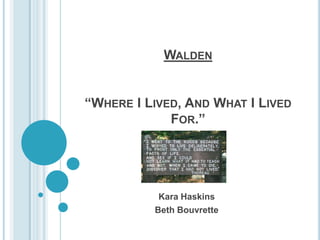
Walden where i lived
- 1. WALDEN “WHERE I LIVED, AND WHAT I LIVED FOR.” Kara Haskins Beth Bouvrette
- 2. WHERE I LIVED Thoreau recalls several places he considered living before deciding on his home in the woods near Walden Pond He never actually purchased a home, but came close when he bought Hollowell place (owners wife changed her mind and Thoreau walked away empty handed) “ I found that I had been a rich man without any damage to my poverty” (Thoreau 68). Thoreau became rich by means of life experience
- 3. WHERE I LIVED CONTINUED… After moving into his home in the woods, Thoreau describes the nature that surrounds him “ Such was not my abode, for I found myself suddenly neighbor to the birds; not by having imprisoned one, but having caged myself near them” (Thoreau 70). Living in the woods has brought him both closer to nature and his spiritual side as well as farther away from society and its harsh standards of living
- 4. WHAT I LIVED FOR Thoreau’s critique of Evidence in text society People are too easily tied “ As long as possible, live down in their daily lives free and uncommitted” (Thoreau 69). We need to take advantage “ That man who does not of every day we are given believe that each day contains an earlier, more sacred, and auroral hour than he has yet profaned, has despaired life, and is pursuing a descending and darkening way” (Thoreau 73).
- 5. WHAT I LIVED FOR CONTINUED… Thoreau’s critique of Evidence in text society People are alive, but don’t “ To be awake is to be truly live their lives and think alive. I have never yet met a deeply man who was quite awake” (Thoreau 74). People worry too much and “ Simplicity, simplicity, don’t have true focus on any simplicity! I say, let your one thing affairs be as two or three, and not a hundred or a thousand” (Thoreau 75).
- 6. WHAT I LIVED FOR CONTINUED… Thoreau’s critique of Evidence in text society Society is full of people “ Men say that a stitch in doing meaningless busy time saves nine, and so they take a thousand stitches to- work day to save nine tomorrow. As for work, we haven’t any of consequence” (Thoreau 76). Life should be lived with a “ Let us spend one day as purpose and not be effected deliberately as Nature, and by insignificant societal not be thrown off the track by problems every nutshell and mosquito’s wing that falls on the rails”( Thoreau 79).
- 7. “ I WENT TO THE WOODS BECAUSE I WISHED TO LIVE DELIBERATELY, TO FRONT ONLY THE ESSENTIAL FACTS OF LIFE, AND SEE IF I COULD NOT LEARN WHAT I HAD TO TEACH, AND NOT, WHEN I CAME TO DIE, DISCOVER THAT I HAD NOT LIVED” (THOREAU 74). Thoreau moved into the woods to escape and unplug from society. This way, he could become one with nature, have his thoughts to himself, and discover the purpose of life.
